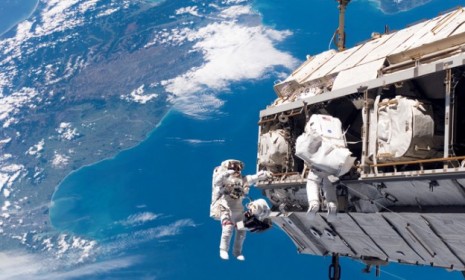NASA's 'highly competitive' astronaut job application
Do you have the right stuff? There's only one way to find out...

A free daily email with the biggest news stories of the day – and the best features from TheWeek.com
You are now subscribed
Your newsletter sign-up was successful
Good news, space fans: NASA is hiring astronauts. The pay is good — anywhere from $64,724 to $141,715 a year. But to be considered, you'll need to meet NASA's "highly competitive" criteria. Only nine candidates were picked out of more than 3,500 applications in 2009. The incoming class of eight to 12 candidates will begin training in 2013, and will work on the next generation of spacecraft meant to take humans into deep space. Do you have what it takes? Here, six highlights from the job application:
1. Social sciences majors need not apply
To qualify, you'll need at least a bachelor's degree in science, engineering or mathematics. Certain degrees are immediate disqualifiers, including nursing, social sciences, aviation, exercise physiology, technology, and some psychology degrees, too. Of course, "an advanced degree is desirable." Interestingly, educators with experience teaching at the K-12 levels are "encouraged to apply."
The Week
Escape your echo chamber. Get the facts behind the news, plus analysis from multiple perspectives.

Sign up for The Week's Free Newsletters
From our morning news briefing to a weekly Good News Newsletter, get the best of The Week delivered directly to your inbox.
From our morning news briefing to a weekly Good News Newsletter, get the best of The Week delivered directly to your inbox.
2. You've gotta fly
The job listing mandates "three years of relevant professional experience." What on Earth does that mean? wonders Sam Biddle at Gizmodo. "Being an astronaut somewhere else?" If you don't have those three years of relevant experience, you'll need to log more than 1,000 hours of airtime piloting a jet aircraft.
3. You must be this tall to ride
"Since astronauts will be expected to fly on Russia's Soyuz spacecraft, they must fit Russia's physical requirements for cosmonauts," says Fox News. "That means no one under 5 foot 2 inches or over 6 foot 3 inches." Applicants brought in for interviews will be measured to make sure they meet the job application's "anthropometric requirements."
A free daily email with the biggest news stories of the day – and the best features from TheWeek.com
4. Speaking Russian helps
"English is the agreed-to language in space," Duane Ross, manager for astronaut training, tells Fox News. But because the U.S. space program now works so closely with its former Cold War competitors, Russian language skills are a major plus for any applicant.
5. It's survival of the fittest
You'll need to pass a drug test, a comprehensive background check, a swimming test, and have 20/20 vision in each eye. It almost goes without saying that candidates will need to be in "incredible shape," notes Biddle. Applicants must pass NASA's long-duration space flight physical, which evaluates individuals based on "physical, physiological, psychological, and social" stressors, like one's ability to work in small, confined spaces for hours on end.
6. And of course...
"Frequent travel may be required."
(See the full job listing here.)
Sources: Business Insider, Fox News, Gizmodo, NASA, Space.com, USA Jobs
-
 Movies to watch in February
Movies to watch in Februarythe week recommends Time travelers, multiverse hoppers and an Iraqi parable highlight this month’s offerings during the deep of winter
-
 ICE’s facial scanning is the tip of the surveillance iceberg
ICE’s facial scanning is the tip of the surveillance icebergIN THE SPOTLIGHT Federal troops are increasingly turning to high-tech tracking tools that push the boundaries of personal privacy
-
 ‘My donation felt like a rejection of the day’s politics’
‘My donation felt like a rejection of the day’s politics’Instant Opinion Opinion, comment and editorials of the day